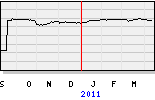
Sanofi pasteur, the vaccines business of the sanofi-aventis Group, has within the framework of FLUPAN, a collaborative research project funded by the European Commission, generated the first clinical trial lot of a new generation of H7N1 pandemic vaccine. This trial will broaden sanofi pasteur's pandemic preparedness program initiated with the development of H5N1 vaccines.
The H7N1 vaccine was produced at sanofi pasteur's Marcy l'Etoile facility in France using Crucell's PER.C6® cell-based technology, allowing an alternative production process expected to offer advantages over traditional manufacturing methods.
This phase I clinical trial, initiated today in Bergen, Norway, is the first to assess the safety and ability to generate an immune response of a split, inactivated prototype pandemic H7N1 vaccine produced on cells.
"The H7N1 vaccine strain was developed from an avian influenza virus (bird flu) by the UK's National Institute for Biological Standards and Control (NIBSC) and the University of Reading (UK). A highly pathogenic H7N1 avian influenza virus which caused outbreaks in Italian poultry in 1999 has been modified, so that it is safe to use and grows well in mammalian cell culture," commented Dr John Wood, FLUPAN Coordinator.
Two influenza subtypes, H5 and H7, have recently caused highly pathogenic avian influenza. While most vaccine development has focused on H5N1 strains, avian H7-containing viruses remain a significant pandemic threat and have caused infections in humans in Europe over the last three years [1].
"The FLUPAN coordinated study started today at the Haukeland University Hospital, University of Bergen (Norway). A total of 60 healthy adults aged 20 to 40 will be vaccinated with one of four formulations: two dosages (12 µg and 24 µg) with or without an aluminum hydroxide adjuvant, an additive commonly used to increase the immune response to vaccines," said Dr Lars R. Haaheim, Principal Clinical Investigator, University of Bergen.
Sanofi pasteur selected PER.C6® cells for their high susceptibility to influenza viruses, thereby making the production of large amounts of influenza vaccine feasible for both pandemic and seasonal strains.
Pandemic Influenza Overview
Influenza is a highly infectious virus that spreads easily from person to person, primarily when an infected individual coughs or sneezes. An influenza pandemic is a global epidemic of an especially virulent virus, newly infectious for humans, with the potential to cause severe morbidity and mortality. According to the World Health Organization (WHO), the next pandemic is likely to result in 1 to 2.3 million hospitalizations and 280,000 to 650,000 deaths in industrialized nations alone. Its impact is expected to be even more devastating in developing countries. In an attempt to minimize the impact of a pandemic, many countries are developing national and transnational plans against an eventual influenza pandemic situation.
Several strains of influenza virus are potentially pandemic. An H7N7 strain was responsible for a large outbreak of fowl plague in the Netherlands in 2003 that spread to 89 humans. While symptoms were mostly mild, one case died from pneumonia in combination with acute respiratory distress syndrome as a result of the infection. The virus was also seen to be transmitted to family contacts[1, 2].
About FLUPAN,
FLUPAN is a European Union (EU) funded collaboration, intended to improve the level of pandemic preparation in the EU. There are six European partners in FLUPAN: National Institute for Biological Standards and Control (NIBSC), UK; University of Reading, UK; Istituto Superiore di Sanita, Italy; Health Protection Agency, UK; University of Bergen, Norway; and sanofi pasteur, the vaccines business of the sanofi-aventis Group, France. For more information,
please visit www.nibsc.ac.uk/spotlight/fluplan.htlm.
About sanofi pasteur and Crucell exclusive agreement
Sanofi pasteur, the vaccines business of the sanofi-aventis Group, entered into a strategic and exclusive agreement with Crucell N.V. on December 31, 2003 to further develop, manufacture and market cell-based novel influenza vaccine products based on Crucell's proprietary PER.C6® cell line technology. The agreement covers both pandemic and seasonal influenza vaccines. Crucell retains commercial rights to the vaccine in Japan.
Crucell's PER.C6® technology is a cell line developed for the large-scale manufacture of biological products including vaccines.
About sanofi-aventis
The sanofi-aventis Group is the world's third-largest pharmaceutical company, ranking number one in Europe. Backed by a world-class R&D organization, sanofi-aventis is developing leading positions in seven major therapeutic areas: cardiovascular disease, thrombosis, oncology, metabolic diseases, central nervous system, internal medicine, and vaccines. The sanofi-aventis Group is listed in Paris (EURONEXT: SAN) and in New York (NYSE: SNY).
Sanofi pasteur, the vaccines business of the sanofi-aventis Group, sold more than a billion doses of vaccine in 2005, making it possible to protect more than 500 million people across the globe. The company offers the broadest range of vaccines, providing protection against 20 bacterial and viral diseases. For more information, please visit: www.sanofipasteur.com.
